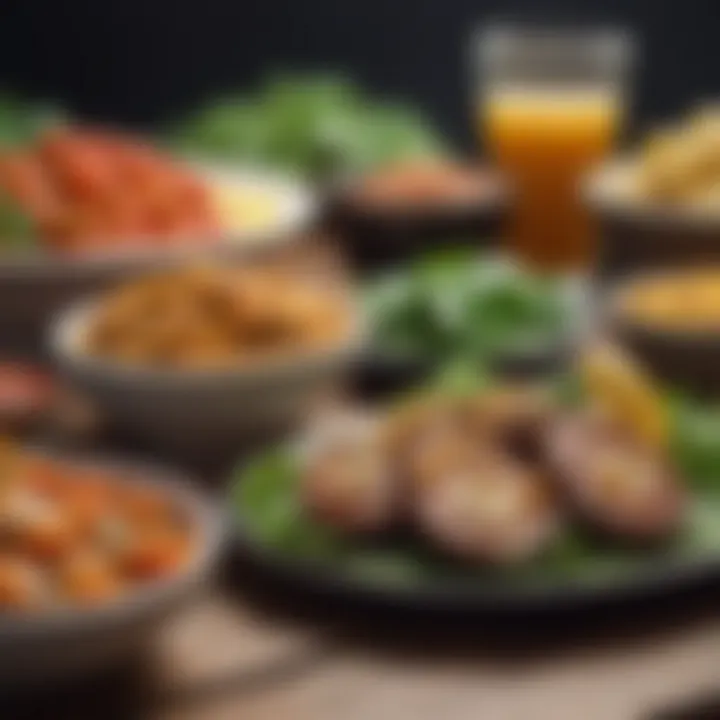Healthy Weight Gain Strategies for Vegetarian Men


Intro
Gaining weight can be a tricky business, especially for vegetarian males who want to do it healthily. Unlike some of their omnivorous counterparts, they don’t have easy access to calorie-dense foods like fatty meats and creamy dairy products. Instead, they rely on plant-based ingredients, which often need some creativity to pack on the pounds. This article digs into practical strategies that vegetarian men can incorporate into their routines to achieve their weight gain goals while maintaining their nutritional values.
In this conversation, we’ll explore essential areas like workout strategies, nutrition tips, and overall wellness practices. We'll shine a light on nutrient-packed foods that are not only delicious but help in energy conservation and muscle gain. Additionally, the focus will be on overcoming the common obstacles faced by those following a vegetarian lifestyle. Let’s catch the bull by the horns and dive into these strategies!
Workout Tips
When it comes to weight gain, working out isn’t just about what gets your heart pumping. It’s crucial to focus on exercises that build muscle mass and strength. Here are a few concrete suggestions that can help:
- Strength Training: Prioritize lifting weights. Engaging in compound movements like squats, deadlifts, and bench presses can stimulate muscle growth. Aim for a routine that challenges your body, ideally 3-4 times a week.
- Bodyweight Exercises: Don’t underestimate push-ups, pull-ups, and dips. These are excellent for building upper body strength. Incorporate them into your workout regimen for well-rounded development.
- Progressive Overload: Gradually increase weights or resistance over time. This method ensures that your body consistently adapts and grows.
- Cardio in Moderation: While cardio is essential for overall fitness, too much can lead to unwanted weight loss. If your primary goal is weight gain, aim for shorter, more intense cardio sessions a few times a week.
"Strength training is the backbone of muscle gain. You feed your muscles when you lift, just as much as when you eat."
Techniques for Muscle Strength and Endurance
Implementing a variety of techniques can aid in developing muscle strength:
- Circuit Training: Integrating both strength and endurance elements can be highly effective. The continuous movement keeps the heart rate up while also promoting muscle engagement.
- Supersets: Pairing two exercises that target opposite muscle groups back-to-back without rest can be advantageous, particularly for time efficiency and hypertrophy.
- Rest and Recovery: Don’t overlook the importance of rest days! Muscles need time to recover and grow stronger. Include active recovery days to maintain mobility without heavy exertion.
Nutrition Advice
As anyone will tell you, you can’t out-train a bad diet. What you consume plays a pivotal role in weight gain. Here are some thoughtful tips to consider:
- High-Calorie Foods: Focus on calorie-dense and nutrient-rich foods. Incorporate items like avocados, nuts, seeds, and whole grains into your diet to maximize caloric intake without feeling stuffed.
- Balanced Meals: Construct meals that pair proteins, carbohydrates, and healthy fats. For a vegetarian, that might look like a quinoa salad with chickpeas, drizzled with olive oil, and topped with seeds.
Sample Meal Plans
Creating a sample meal plan tailored towards muscle-building and caloric surplus might look something like this:
- Breakfast: Oatmeal topped with nut butter, banana, and a sprinkle of chia seeds.
- Snack: A smoothie containing spinach, protein powder, almond milk, and peanut butter.
- Lunch: Grilled vegetable wrap with hummus and a side of mixed nuts.
- Snack: Greek yogurt with granola and fruits.
- Dinner: Stir-fried tofu with brown rice and steamed broccoli.
Each meal should aim to provide the necessary macronutrients while also ensuring the body gets adequate vitamins and minerals.
Wellness Insights
Weight gain isn’t just about physical exertion and nutrition. It’s also essential to mind your mental health and overall wellness:
- Stress Management: Techniques like meditation, deep breathing, or light yoga can help manage daily stressors, ensuring that your body remains in a positive state for muscle building and weight gain.
- Holistic Health: Join mindfulness practices for overall well-being, which benefit both body and mind. Being in a healthy headspace can influence one’s dedication to fitness and dietary goals.
- Self-Care: Establish a routine that includes activities you enjoy. This could be reading, soaking in a bath, or taking nature walks; nurturing your self-care regime is vital for long-term success.
Reach your weight gain goals, fully knowing you are investing in your health without sacrificing your principles.
Understanding the Need for Weight Gain
Gaining weight can be just as challenging for some individuals as losing it is for others. For vegetarian males, the need for weight gain often stems from various lifestyle choices, metabolic differences, or even health conditions. Understanding this need is crucial for developing tailored strategies that work. This article intends to address these specific needs by recognizing the importance of healthy weight gain among vegetarian males.
Weight gain may be necessary for numerous reasons ranging from personal goals like improving athletic performance, to medical recommendations aimed at achieving a more balanced body mass index. Embracing a weight gain journey requires careful planning and a gear shift in dietary habits, particularly for those on a vegetarian diet.
Reasons for Being Underweight
Being underweight is not simply an aesthetic issue; it can signal underlying health concerns or lifestyle factors that deserve attention. There are myriad reasons a vegetarian male might find himself below a healthy weight. Some might have a naturally high metabolism that burns calories faster than they can consume them. Others might experience occasional digestive issues, making it hard to retain calories. Outside of biology, factors like stress, mental health struggles, or simply not knowing how to craft a robust meal plan can also contribute to an inadequate caloric intake.
Common reasons include:
- High metabolic rate - Naturally burn more calories than the average person.
- Dietary Restrictions - Specific food choices may limit caloric intake.
- Health Conditions - Illnesses or medications may suppress appetite or hinder weight gain.
- Lifestyle Choices - Busy schedules can lead to skipping meals or opting for unsatisfying snacks.
Health Implications of Being Underweight
Being underweight can carry a host of health risks that are often underestimated. A lower body weight might lead to weakened bones and an increased risk of fractures. Nutrient deficiencies can arise from inadequate caloric consumption, leading to the risk of anemia, impaired immune function, and general fatigue. This can spiral into a lack of energy to participate in daily activities or workouts, further exacerbating weight issues.
"Weight is not just a number on a scale; it directly links to your physical and mental well-being."
Some of the pressing health implications include:
- Decreased Immune Function - Can lead to frequent illnesses.
- Hormonal Imbalance - May cause reproductive health issues.
- Low Energy Levels - Impacts daily productivity and exercise performance.
- Mental Health - Feeling self-conscious or experiencing anxiety related to body image can take a toll.
Understanding the need for weight gain, particularly for vegetarian males, is the first step in crafting a plan that does not compromise health while focusing on achieving one's personal goals. With the right guidance and support, engaging in a successful weight gain journey is attainable.
The Vegetarian Diet: An Overview
Understanding the vegetarian diet is crucial for those who are aiming to gain weight in a healthy and effective manner. A vegetarian diet primarily emphasizes plant-based foods while minimizing or entirely excluding animal products, depending on the specific type followed. This approach can provide a wealth of nutrients that support overall health and weight gain when executed thoughtfully.
It's important to recognize that not all vegetarian diets are created equal. Each variation comes with its own strengths and weaknesses, especially concerning caloric intake and nutritional diversity. For vegetarian males looking to put on weight, choosing the right type of vegetarian diet can make a significant impact on their journey.
Types of Vegetarian Diets
When it comes to vegetarianism, there’s a spectrum of dietary restrictions and allowances. Here, we’ll break down some common types and how they can aid weight gain.
Lacto-Vegetarian
The lacto-vegetarian diet includes dairy products while excluding eggs. This particular style is a popular choice because it maintains a good source of protein and calcium without the complexities that come with consuming meat. The main characteristic is its inclusion of dairy, which can be rich in calories and healthy fats, making it easier to achieve a caloric surplus. For those who are used to consuming dairy, this diet can be a seamless transition into vegetarianism.
One of its unique features is the ability to include a variety of milk-based products, like cheese or yogurt, which can be used to create higher-calorie meals. However, one must be cautious about lactose intolerance, which might limit dairy consumption for some individuals.


Ovo-Vegetarian
Ovo-vegetarians incorporate eggs into their diet but exclude dairy. This approach provides a different protein source comparatively, allowing for a flexible meal planning strategy. Eggs are an exceptional addition for weight gain goals due to their nutrient density and high caloric content, especially in yolks.
The key characteristic that sets this diet apart is the abundance of quality proteins available through egg consumption, significantly aiding in muscle repair and growth. One drawback could be the limited variety in terms of vegetarian protein sources when compared to lacto-vegetarians, but with some thoughtful planning, it can still be effective.
Lacto-Ovo Vegetarian
This type combines both eggs and dairy, capturing the best of both worlds. The lacto-ovo vegetarian diet provides a high range of food options, making it easier to maintain a nutrient-rich diet while also increasing caloric intake. The flexibility is beneficial for weight gain as it allows for diverse meal options that are typically calorically dense.
With the inclusion of a variety of proteins and the ability to indulge in creamy, rich meals, lacto-ovo vegetarians often find it easier to incorporate the necessary calories into their daily routine. The challenge might be navigating choices that align with personal beliefs and values regarding the consumption of animal products.
Vegan
Vegan diets eliminate all animal products, emphasizing complete reliance on plant-based food sources. This can initially seem daunting for weight gain, but with strategic meal planning, it's very achievable. A vegan diet encourages the intake of a wide variety of fruits, vegetables, grains, nuts, and seeds, which can be nutrient-dense and calorie-rich.
A major characteristic of a vegan diet is its foundation on whole foods, which might promote better health, though it can also result in potential deficiencies if not approached correctly. Some disadvantages include the challenge of obtaining sufficient protein and calories, which makes meal planning essential for maintaining caloric surplus.
Nutritional Benefits of a Vegetarian Diet
The vegetarian diet isn't just about cutting out meat; it comes with a platter of nutritional benefits that can positively contribute to health and well-being. Some of these potential benefits include improved heart health, lower cholesterol levels, and higher intakes of essential vitamins and minerals. Moreover, incorporating fiber-rich foods into a diet can maintain digestive health and manage weight more effectively, which is somewhat ironic, given that the purpose here is to gain weight.
In the context of weight gain, a well-planned vegetarian diet can marry nutrient density with caloric intake. Choosing foods rich in healthy fats, quality proteins, and whole grains can create a balanced approach that doesn't compromise health while pursuing increased body weight. Overall, understanding the nuances of each type of vegetarian diet allows individuals to curate a personalized and effective strategy for healthy weight gain.
Caloric Surplus: A Key to Weight Gain
Gaining weight effectively, particularly for those who adhere to a vegetarian lifestyle, necessitates a deeper understanding of caloric surplus. This concept centers on consuming more calories than the body expends, a principle crucial for anyone looking to see the scale tip positively. While physical activity plays a role in weight fluctuation, achieving a caloric surplus is primarily about making intentional food choices that create a positive balance.
Vegetarian males often face unique challenges in gaining weight, as many plant-based foods, while nutritious, can be lower in calories compared to their animal-based counterparts. Thus, knowing how to maximize caloric intake without sacrificing nutrition stands at the forefront of their weight gain journey. A well-planned caloric surplus allows the body not only to accumulate weight but potentially to build muscle, which is an important consideration in any healthy weight gain strategy.
What is a Caloric Surplus?
Simply put, a caloric surplus occurs when the number of calories consumed exceeds the number of calories burned. This condition essentially leads the body to store excess energy in the form of fat or muscle. To elucidate this, consider the following:
- Energy Balance: The foundation of gaining weight is rooted in understanding the energy balance equation. If you eat 2,500 calories but only burn 2,000, you have a surplus of 500 calories.
- Weight Gain: A pound of body weight generally equates to about 3,500 excess calories. So, adding approximately 500 calories per day can lead to a gain of about one pound per week.
Understanding what constitutes a caloric surplus is vital for vegetarian males aiming to gain weight responsibly. It's not merely about eating more; it's about eating smarter.
Calculating Your Daily Caloric Needs
Calculating daily caloric needs might sound daunting, but it's simpler than it appears. Start by determining your Basal Metabolic Rate (BMR), which is the number of calories your body requires for basic physiological functions at rest. Factors like age, weight, height, and gender play significant roles in calculating BMR. Several online calculators can assist in this task, as can formulas such as the Harris-Benedict equation.
Once you have your BMR, you need to adjust for activity level:
- Sedentary (little or no exercise): BMR x 1.2
- Lightly active (light exercise/sports 1-3 days/week): BMR x 1.375
- Moderately active (moderate exercise/sports 3-5 days/week): BMR x 1.55
- Very active (hard exercise/sports 6-7 days a week): BMR x 1.725
- Extra active (very hard exercise/physical job): BMR x 1.9
This adjusted number gives you the total number of calories you need to maintain your weight. To encourage weight gain, add an additional 300 to 500 calories to this number, ensuring your diet is both calorically rich and nutritionally sound.
Remember, achieving your weight gain goals requires careful and thoughtful planning.
Emphasizing Nutrient-Dense Foods
When it comes to gaining weight, especially for vegetarian males, the focus needs to be more than just increasing caloric intake. Incorporating nutrient-dense foods into one’s diet is crucial to ensure that these extra calories come from foods rich in vitamins, minerals, and healthy fats that also help to optimize overall health. A well-thought-out approach to dietary intake can make a remarkable difference, not only in achieving weight gain goals but also in promoting vitality and well-being.
Nutrient-dense foods provide a higher amount of nutrients relative to their calorie content. So, it's not just about eating more but eating smarter. A daily diet filled with healthful options will fuel the body effectively while minimizing potential health risks linked to poor dietary habits.
Foods High in Healthy Fats
Healthy dietary fats play a significant role in acquiring the necessary nutrients for muscle growth and overall health. These fats, beyond just being calorie-dense, are essential for hormone production and absorption of fat-soluble vitamins—the likes of Vitamin A, D, E, and K. Let's take a closer look at some specific sources of healthy fats:
Nuts and Seeds
Nuts and seeds are remarkably nutrient-dense and packed with beneficial properties. For instance, almonds and sunflower seeds are loaded with protein and healthy fats, and they can easily be added to meals or snacks. What makes them stand out is their versatility; they can be tossed into smoothies, oatmeal, or salads, adding a delightful crunch.
One unique feature of nuts and seeds is their fiber content. This can be quite beneficial as it aids in digestion and helps maintain a steady blood sugar level, which is crucial for long-term energy—especially for those engaging in workouts aimed at gaining weight.
However, it's essential to be mindful of portions. While they are beneficial, their high caloric density means that overindulging can quickly lead to excessive calorie intake.
Avocado
Avocado is a powerhouse when it comes to healthy fats, primarily known for its monounsaturated fat content. It’s famous for its creamy texture and can be easily incorporated into various dishes, from salads to spreads. One key characteristic of avocados is their high potassium levels, crucial for muscle function and recovery.
The unique feature of avocados lies in their heart-healthy monounsaturated fats that may help reduce bad cholesterol levels. Moreover, they are fantastic for nutrient absorption—helping the body process phytonutrients from vegetables more effectively. The downsides could include the relatively higher price point and potential spoilage if not consumed timely.
Coconut Products
Coconut products, such as coconut oil and coconut milk, offer an excellent source of medium-chain triglycerides (MCTs) which the body utilizes for quick energy, making them a beneficial addition for weight gain. The key characteristic of coconut products is their ability to enhance metabolic rate, providing energy bursts suitable for vigorous training sessions or daily activities.
Coconut products also bring a unique flavor to any dish, making them popular in various cuisines. However, one downside to consider is the fact that they may be higher in saturated fats, which requires moderation in consumption.
Protein-Rich Plant Sources
Protein is a non-negotiable for gaining muscle mass. Fortunately, there’s an abundant variety of protein sources available for vegetarians. These foods are essential to support tissue repair and muscle growth and are packed with their own array of beneficial nutrients.


Lentils and Beans
Lentils and beans are star players in a vegetarian diet due to their high protein content and fiber, making them both filling and nutritious. Lentils, in particular, are an outstanding choice because they boast around 18 grams of protein per cooked cup.
Their unique feature lies in their quick cooking time and convenience, making them ideal for meal prep. However, some individuals may experience bloating due to their fiber content, so it's good to introduce them gradually.
Soy Products
Soy products, such as tofu, tempeh, and edamame, offer complete proteins, which is somewhat rare in the plant kingdom. They include all essential amino acids that the body cannot produce.
The versatile nature of soy makes it a beneficial choice—it can be used in a plethora of dishes, from stir-fries to smoothies. One potential downside might be the concern about soy’s impact on hormone levels, particularly in large quantities, necessitating moderation.
Quinoa
Quinoa is often touted as a superfood, primarily due to its complete protein profile and high mineral content. It's a gluten-free grain, containing about 8 grams of protein per cooked cup. The key characteristic of quinoa is that it cooks quickly and can serve as a base for salads or side dishes, enriching meals without overwhelming flavors.
The unique feature of quinoa is its high magnesium content, which aids muscle function and plays a role in numerous biochemical reactions within the body. However, it's worth noting that quinoa can be relatively more expensive than other grains, which may affect its accessibility for some individuals.
Incorporating Whole Grains
Whole grains provide essential carbohydrates necessary for energy, making them vital for anyone looking to gain weight. Whole grains are not only energy-dense but also packed with vitamins, minerals, and fibers that are crucial for overall health.
Brown Rice
Brown rice is considered a staple for many vegetarians. It’s a whole grain that is less processed than white rice, retaining its nutrients and fiber. A key aspect of brown rice is its gradual digestion, leading to sustained energy release that can be particularly useful during workout sessions.
Brown rice carries its own unique feature of additional nutrients, such as selenium and manganese, which contribute to metabolic processes. However, the longer cooking time compared to white rice might be a drawback for some who are short on time.
Whole Wheat Bread
Whole wheat bread is another staple that provides a good balance of carbs and fiber, which aids in the feeling of fullness. A notable characteristic of whole wheat bread is its relatively high fiber content, beneficial for digestive health.
The unique feature here would be its use as a vehicle for various spreads and toppings, enhancing the possibilities for snacks or meals. One limitation is the gluten within, which may pose concerns for those with sensitivities or celiac disease.
Oats
Oats are another fantastic whole grain that packs quite a punch in the nutrient department. With high soluble fiber content, oats can help with cholesterol levels and provide long-lasting energy. They are easy to prepare and can be creative in terms of incorporation—think oatmeal, granola bars, or smoothies.
A unique feature of oats is their versatility in recipes, making them suitable for breakfast, snacks, or even baking. However, when consuming instant oats, one must be careful with added sugars that could detract from their health benefits.
In sum, a thoughtful incorporation of nutrient-dense foods into a weight gain strategy can create a powerful push towards achieving health goals for vegetarian males. Overall, the balance of healthy fats, proteins, and whole grains can lead to sustained energy levels, muscle growth, and a much healthier overall lifestyle.
Meal Planning for Weight Gain
When it comes to gaining weight, meal planning plays a crucial role. A well-structured meal plan ensures you are consistently consuming more calories than your body burns. Unlike simply munching on snacks throughout the day, a detailed meal approach allows for thoughtful consideration of nutrient intake. It helps in incorporating a diverse range of food groups, ensuring that you're getting the necessary macronutrients and micronutrients.
Not only does this strategic planning help in achieving your weight gain goals, but it also provides a sense of routine. For vegetarian males, the challenge lies in selecting appropriate foods that maintain a plant-based diet while still allowing an increase in caloric intake. Ultimately, when meal planning is done right, one can create a roadmap to success, steering clear of commonly faced pitfalls of being underweight.
Creating a Balanced Meal Plan
A balanced meal plan is not just about adding extra calories; it’s about smart choices that cater to overall health. A well-rounded vegetarian meal includes a variety of foods such as fruits, vegetables, whole grains, and protein-rich sources. Incorporating these food groups minimizes the risk of nutritional deficiencies and maximizes weight gain.
A good starting point is to include:
- Carbohydrates: Foods like brown rice, whole wheat pasta, and sweet potatoes are calorically dense while also providing essential fibers.
- Proteins: Lentils, chickpeas, and tofu will keep the muscle growth on the right track.
- Healthy Fats: Avocado, olive oil, and nuts contribute significantly to calorie intake without overloading the stomach.
Striking a balance also means being aware of portion sizes to ensure meals are nutritious rather than just high in calories. This thoughtful approach not only promotes weight gain but also establishes healthy eating habits that can last a lifetime.
Snacking for Extra Calories
Snacking can act as a bridge between meals, providing extra calories needed for weight gain. When done right, it can be an effective strategy for vegetarians aiming to bulk up without feeling overly stuffed.
Nut Butters and Dried Fruits
Nut butters blended with dried fruits creates a convenient and highly nutritious snack option. Nut butters, like almond or peanut butter, are packed with healthy fats and proteins. A single tablespoon contains a hefty amount of calories, making them an excellent choice for quick calorie boosts. Pairing these with dried fruits, which are often calorie-dense, adds natural sugars and additional fiber to the mix.
Unique features of nut butters and dried fruits include the versatility of use; you can spread them on toast, mix them into oatmeal, or simply enjoy them by the spoonful. Their only downside might be the potential for added sugars in some processed dried fruits. Thus, choosing unsweetened options may preserve their health benefits.
Smoothies and Protein Shakes
Smoothies and protein shakes take the cake when it comes to caloric intake with minimal effort. They have the unique characteristic of being both nutritious and easily customizable. Whether it’s a banana, spinach, plant-based protein powder, or even avocado, you can toss in anything that suits your taste and dietary needs!
For vegetarian males looking to gain weight, these drinks are particularly advantageous since they allow for increased caloric intake in a drinkable format, thus reducing the feeling of fullness that can sometimes inhibit eating. However, relying exclusively on smoothies may lead to inadequate satiety. Therefore, it’s best to make them a part of an overall balanced diet rather than the primary source of nutrition.
"Meal planning isn’t just a necessity; it’s an effective strategy that turns the tables in your favor when it comes to health and nutrition."
Establishing regular meal planning while embracing some of these additional snack options can make a world of difference in the pursuit of weight gain among vegetarian males.
Strength Training and Exercise Considerations
When focusing on weight gain, especially for vegetarian males, strength training might seem like an optional add-on. However, it plays a pivotal role in not only building muscle but also enhancing overall health. The concept goes beyond merely lifting weights; it’s about creating a structured approach that harmonizes with dietary strategies. This section delves into why incorporating strength training can take one’s weight gain journey several steps further.
The Importance of Resistance Training


Resistance training is vital for those looking to gain weight sustainably. It promotes muscle hypertrophy, which means your body won't just put on weight; it’ll add muscle mass that contributes to strength and energy levels. The beauty of this practice lies in how it engenders a positive feedback loop: more muscle equals a higher metabolism, which can help in managing body composition better over time.
Among various workout techniques, resistance training allows vegetarians to utilize plant-based proteins effectively. Unlike cardio, which may lead to muscle loss if not coupled with adequate calorie intake, resistance training helps preserve existing muscle while promoting new growth.
"Strength training is not merely lifting weights; it's about crafting a physique that embodies health and vitality."
Effective Workouts for Gaining Weight
To achieve the weight gain goal, it's essential to design effective workouts targeted around strength training. Here, we explore two critical methods: compound exercises and progressive overload.
Compound Exercises
Compound exercises are a cornerstone in any strength training regimen focused on weight gain. These moves involve multiple muscle groups and joints, making them time-efficient and effective. This includes exercises like squats, deadlifts, and bench presses. What makes compound exercises especially beneficial is that they mimic natural movements. This means they can encourage the body to respond more positively, promoting greater calorie expenditure and muscle recruitment during workouts.
Incorporating compound exercises not only accelerates metabolic rate but also maximizes time spent exercising. They can be easily modified to accommodate different fitness levels, which is important for those new to strength training. One standout feature of compound moves is their capacity to generate a favorable hormonal response, including the release of testosterone and growth hormone, both of which are crucial for muscle development.
Progressive Overload
Progressive overload is another key aspect that can't be overlooked when aiming for weight gain. This principle refers to gradually increasing the stress placed on the body during exercise, encouraging continuous improvements in muscle size and strength. Unlike a one-size-fits-all approach, progressive overload allows for personalized adaptation over time, making it easier for individuals to tailor their routines.
The beauty of progressive overload lies in its flexibility; it can be executed through varying weight, reps, or intensity of exercises. This dynamic approach ensures that workouts remain challenging, preventing plateaus that can stall progress. While it demands consistency and commitment, the rewards typically manifest in the form of noticeable muscle gains and enhanced performance.
In summary, integrating meaningful strength training practices into a weight gain strategy for vegetarian males is not just wise but essential. The dual focus on resistance training and the principles of progressive overload lays a strong foundation for achieving sustainable weight gain. By understanding and implementing these elements, individuals can promote muscle growth, boost energy levels, and ultimately create a healthier version of themselves.
Monitoring Progress and Adjustments
Monitoring your weight gain journey is a crucial element for vegetarian males trying to bulk up healthily. Just like a ship needs a compass to reach its destination, tracking your weight and adjusting your plan is the way to navigate towards your weight gain goals. It’s not just about piling on pounds; it's about doing it in a way that promotes overall health and well-being. Understanding how to monitor progress means being aware of what's working versus what’s not, and tweaking the aspects of your diet and exercise accordingly.
Tracking Weight Gain
Keeping an eye on your weight can help you stay accountable. Regular check-ins—whether it's weekly or biweekly—allow you to see trends over time. Here are some tips:
- Use a Reliable Scale: Ensure your scale is calibrated and placed on a flat surface. The reading should be checked at the same time of day, preferably in the morning.
- Keep a Journal: Document your weight and your meals. This isn't just about numbers; you might also jot down how you felt after certain foods or workouts.
- Measure Body Composition: It’s helpful to look beyond the scale. Body measurements (like waist, hips, and chest) and even body fat percentage can provide a fuller picture of your changes.
Tracking can sometimes feel like watching paint dry, but patience is key. If you see a plateau, it doesn’t mean you’re failing; it may indicate you need a change. The goal is to foster an environment where your body can thrive and grow.
Adjusting Diet and Exercise Plans
As you progress, staying flexible and willing to adjust your approach is essential. Here’s how to recalibrate effectively:
- Assess Caloric Intake: If weight gain stalls, you might need to up your caloric intake. Use apps or calculators to ensure you're hitting the appropriate numbers.
- Tweak Macronutrient Ratios: If you’re focusing heavily on carbs, consider swapping in more healthy fats or proteins, which can enhance satiety and muscle gain.
- Fine-Tune Meal Timing: Experiment with when you eat. Sometimes, compacting meals into a smaller window can make meals feel more substantial, which might help with calorie count.
- Vary Your Workouts: If your exercise routine feels stale, try changing it up. Incorporate different strength training techniques or increase weights progressively. This keeps your body guessing and can encourage growth.
- Seek Feedback: If you're unsure, consulting a nutritionist or fitness coach can provide outside perspectives that help fine-tune your strategy.
"Successful weight gain, like any endeavor, benefits from an adaptive strategy. What works for one individual may not for another; it’s about finding the balance that suits you best."
In summary, monitoring progress isn’t merely about numbers; it’s about creating an informed strategy that evolves with you. This approach helps ensure that your efforts lead not just to weight gain but to improved strength, vitality, and overall health.
Addressing Common Challenges
Gaining weight, particularly for vegetarian males, is not just a straightforward process of eating more; it can be riddled with various obstacles. Addressing these common challenges is essential for effectively implementing strategies that lead to successful weight gain. These issues may not only hinder physical progress but can also impact mental well-being. By recognizing challenges such as lack of appetite and lifestyle constraints, individuals can develop targeted techniques aimed at overcoming barriers and enhancing their weight gain journey. Here's a closer look at those hurdles and how to navigate them.
Overcoming Lack of Appetite
An often overlooked aspect in the quest for weight gain is a simple yet troubling issue: appetite. Many vegetarian males, whether due to personal preferences or dietary choices, might find it difficult to consume the calories needed for a caloric surplus. A lack of appetite can stem from several factors, including the natural dietary composition, lifestyle habits, or even stress.
To combat this, it's vital to make meals as appealing as possible. This can mean experimenting with flavorful spices or making meals more visually appealing. Small, frequent meals or snacks throughout the day can also help. Rather than focusing solely on large meals, consider incorporating nutrient-dense snacks like trail mixes or peanut butter on whole grain toast, which can easily add calories without overwhelming one's appetite too much. Think about finding unique combinations of food that pair well together, perhaps a spicy chickpea salad.
Dealing with Lifestyle Limitations
Often, it is not just about one’s will to eat more, but also about lifestyle limitations that contribute to challenges in weight gain. These limitations usually come in two forms.
Time Constraints
In today's busy world, time constraints can play a disruptive role in meal preparation and consumption. With work, studies, or personal obligations, finding time to cook healthy meals can feel like an uphill battle. When schedules are packed, it can be easy to resort to convenience foods that are not calorie-rich or nutritious. These time limitations might result in skipping meals or settling for less-than-ideal food options.
However, one can turn this around by engaging in meal prep. On days off, preparing and cooking multiple servings ahead of time can save significant time during the week. Having ready-to-eat meals stored can ensure more consistent calorie intake. For instance, making a batch of lentil stew that can be ready for lunch throughout the week is a smart way to approach time constraints while still sticking to a healthy plan.
Budget Considerations
Adopting a vegetarian diet doesn't mean breaking the bank, but budget considerations can undeniably affect dietary choices. Higher prices of organic or specialty foods can leave individuals feeling as if they have to compromise their nutritional goals for financial reasons. At the same time, one often worries that the cheapest options might not provide adequate caloric intake or nutrients needed for weight gain.
The key is finding a balance. Start by prioritizing affordable, nutrient-dense foods like legumes, rice, and seasonal vegetables that are easy on the wallet. Buying in bulk can also be a game-changer—just like how bulk quinoa, oats, or dried beans can provide nutritious, high-calorie options without a hefty price tag. Furthermore, exploring local farmers’ markets can sometimes reveal deals on fresh produce that can stimulate culinary creativity at a low cost.
Always remember, gaining weight takes time and effort. It’s a marathon, not a sprint. Patience and persistence are just as important as the food on your plate.
In summary, by addressing these hurdles—whether it's enhancing appetite, overcoming time constraints, or managing budgets—vegetarian males can put themselves on a path toward successful weight gain. Engaging these challenges with strategic planning and a proactive mindset highlights the importance of a tailored approach.
End: Achieving Your Weight Gain Goals
In the journey toward weight gain, especially for vegetarian males, it's crucial to understand that success isn't just a sprint; it's a marathon. As we explored throughout this article, weight gain is a multi-faceted endeavor that hinges on careful planning, consistent effort, and the use of the right nutritional strategies. But why is this conclusion so pivotal?
Firstly, adopting a patient mindset streams into every aspect of this process. The human body doesn't transform overnight, and overlooking this fundamental truth can lead to frustration. When you set realistic expectations, you’re more likely to stick with your plan. Remember, gradual weight gain is not only healthier but also more sustainable. This approach allows your body to adjust to changes without going into shock, maintaining metabolic balance and muscle gain over time.
Secondly, consistency plays a vital role. Just as one day of poor eating or skipping a workout won't lead to an immediate downfall, the reverse holds true: a dedicated routine fosters a steady climb toward your goals. For vegetarian males, this means consistently incorporating nutrient-dense foods into diets, regular meal planning, and embracing strength training exercises. Adding these dimensions requires an ongoing commitment—it's not a one-off task.
In addressing the dietary aspects, consider the significance of tracking your progress. Recording what you eat, the workouts you complete, and how you feel physically can unveil trends you might miss otherwise. This data fuels adjustments to your plan when necessary, ensuring you stay on the right path.
"Progress requires relentless notice of what works and what doesn’t. Change is impossible without understanding."
Lastly, it's important to recognize that being patient and consistent in your actions often leads to positive mental adjustments. Self-efficacy, or your belief in your ability to succeed in specific situations, strengthens with each small achievement. Celebrate milestones, whether that’s hitting a particular weight or achieving a new personal best in the gym. These victories pave the road forward.
In summary, with a strategy focusing on gradual changes, alongside an unwavering commitment to your goals, vegetarian males can successfully navigate the weight gain process. It is achievable with thoughtfulness and a strategic game plan.







